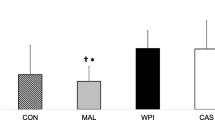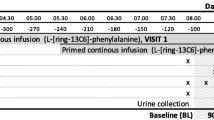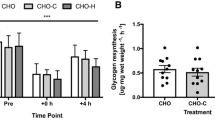Abstract
Given that the enhanced oxidative adaptations observed when training in carbohydrate (CHO)-restricted states is potentially regulated through free fatty acid (FFA)-mediated signalling and that leucine-rich protein elevates muscle protein synthesis, the present study aimed to test the hypothesis that leucine-enriched protein feeding enhances circulating leucine concentration but does not impair FFA availability or whole body lipid oxidation during exercise. Nine males cycled for 2 h at 70 % VO2peak when fasted (PLACEBO) or having consumed a whey protein solution (WHEY) or a leucine-enriched whey protein gel (GEL), administered as 22 g 1 h pre-exercise, 11 g/h during and 22 g 30 min post-exercise. Total leucine administration was 14.4 g and 6.3 in GEL and WHEY, respectively. Mean plasma leucine concentrations were elevated in GEL (P = 0.001) compared with WHEY and PLACEBO (375 ± 100, 272 ± 51, 146 ± 14 µmol L−1, respectively). No differences (P = 0.153) in plasma FFA (WHEY 0.53 ± 0.30, GEL 0.45 ± 0.25, PLACEBO 0.65 ± 0.30, mmol L−1) or whole body lipid oxidation during exercise (WHEY 0.37 ± 0.26, GEL 0.36 ± 0.24, PLACEBO 0.34 ± 0.24 g/min) were apparent between trials, despite elevated (P = 0.001) insulin in WHEY and GEL compared with PLACEBO (38 ± 16, 35 ± 16, 22 ± 11 pmol L−1, respectively). We conclude that leucine-enriched protein feeding does not impair FFA availability or whole body lipid oxidation during exercise, thus having practical applications for athletes who deliberately train in CHO-restricted states to promote skeletal muscle adaptations.



Similar content being viewed by others
References
Areta JL, Burke LM, Ross ML, Camera DM, West DW, Broad EM, Jeacocke NA, Moore DR, Stellingwerff T, Phillips SM, Hawley JA, Coffey VG (2013) Timing and distribution of protein ingestion during prolonged recovery from resistance exercise alters myofibrillar protein synthesis. J Physiol 591:2319–2331
Bartlett JD, Joo CH, Louhelainen J, Cochran JR, Gibala MJ, Iqbal Z, Gregson WA, Close GL, Drust B, Morton JP (2013) Reduced carbohydrate availability enhances exercise-induced phosphorylation of p53 in human skeletal muscle: implications for mitochondrial biogenesis. Am J Physiol 304:R450–R458
Blomstrand E (2006) A role for branched-chain amino acids in reducing central fatigue. J Nutr 136:544–547
Blomstrand E, Moller K, Secher NH, Nybo L (2005) Effect of carbohydrate ingestion on brain exchange of amino acids during sustained exercise in human subjects. Acta Physiol Scand 185:203–209
Borg G (1970) Physical training. 3. Perceived exertion in physical work. Lakartidningen 67:4548–4557
Bowtell JL, Leese GP, Smith K, Watt PW, Nevill WA, Rooyackers O, Wagenmakers AJM, Rennie MJ (1998) Modulation of whole body protein metabolism, during and after exercise, by variation of dietary protein. J Appl Physiol 85:1744–1752
Breen L, Philp A, Witard OC, Sarah R, Selby A, Smith K, Baar K, Tipton KD (2011) The influence of carbohydrate-protein co-ingestion following endurance exercise on myofibrillar and mitochondrial protein synthesis. J Physiol 589:4011–4025
Burke LM (2010) Fuelling strategies to optimize performance: training high or training low? Scand J Med Sci Sports 20(Suppl 2):48–58
Cabone JW, Margolis LM, McClung JP, Cao JJ, Murphy NE, Sauter ER, Combs GF Jr, Young AJ, Pasiakos SM (2013) Effects of energy deficit, dietary protein, and feeding on intracellular regulators of skeletal muscle proteolysis. FASEB J 27:5104–5111
Cermak NM, Van Loon LJ (2013) The use of carbohydrates during exercise as an ergogenic aid. Sports Medicine 43:1139–1155
Churchward-Venne TA, Breen L, Di Donato DM, Hector AM, Mitchell CJ, Moore DR, Stellingwerff T, Breuille D, Offord EA, Baker SK, Phillips SM (2014) leucine supplementation of a low-protein mixed macronutrient beverage enhances myofibrillar protein synthesis in young men: a double-blind, randomized trial. Am J Clin Nutr 99:276–286
Cochran AJ, Little JP, Tarnopolsky MA, Gibala MJ (2010) Carbohydrate feeding during recovery alters the skeletal muscle metabolic response to repeated sessions of high-intensity interval exercise in humans. J Appl Physiol 108:628–636
Coffey VG, Moore DR, Burd NA, Rerecich T, Stellingwerff T, Garnham AP, Phillips SM, Hawley JA (2011) Nutrient provision increases signalling and protein synthesis in human skeletal muscle after repeated sprints. Eur J Appl Physiol 11:1473–1483
Fyffe SA, Alphey MS, Buetow L, Smith TK, Ferguson MA, Sorensen MD, Bjorkling F, Hunter WN (2006) Recombinant human PPAR-beta/delta ligand-binding domain is locked in an activated conformation by endogenous fatty acids. J Mol Biol 356:1005–1013
Hansen AK, Fischer CP, Plomgaard P, Andersen JL, Saltin B, Pedersen BK (2005) Skeletal muscle adaptation: training twice every second day vs. training once daily. J Appl Physiol 98:93–99
Hawley JA, Morton JP (2014) Ramping up the signal: Promoting endurance training adaptation in skeletal muscle by nutritional manipulation. Clin Exp Pharmacol Physiol 41:608–613
Hawley JA, Schabort EJ, Noakes TD, Dennis SC (1997) Carbohydrate-loading and exercise performance. An update. Sports Med 24:73–81
Howarth KR, Phillips SM, MacDonald MJ, Richards D, Moreau NA, Gibala MJ (2010) Effect of glycogen availability on human skeletal muscle protein turnover during exercise and recovery. J Appl Physiol 109:431–438
Hulston CJ, Venables MC, Mann CH, Martin A, Philp A, Barr K, Jeukendrup AE (2010) Training with low muscle glycogen enhances fat metabolism in well trained cyclists. Med Sci Sports Exer 42:2046–2065
Hulston CJ, Wolsk E, Grondahl TS, Yfanti C, Van Hall G (2011) Protein intake does not increase vastus lateralis muscle protein synthesis during cycling. Med Sci Sports Exer 43:1635–1642
Jeukendrup AE, Wallis GA (2005) Measurement of substrate oxidation during exercise by means of gas exchange measurements. Int J Sports Med 26(Suppl 1):28–37
Kenzierski D, DeCarlo KJ (1991) Physical activity enjoyment scale: two validation studies. J Sport Exer Psychol 13:50–64
Lane SC, Areta JL, Bird SR, Coffey VG, Burke LM, Desbrow B, karagounis LG, Hawley JA (2013) Caffeine ingestion and cycling power output in a low or normal muscle glycogen state. Med Sci Sports Exer 45:1577–1584
Lee MJC, Hammond KM, Vasdev A, Poole KL, Impey SG, Close GL, Morton JP (2014) Self-selecting fluid intake while maintaining high carbohydrate availability does not impair half-marathon performance. Int J Sports Med, in press
Lemon PW, Mullin JP (1980) Effect of initial muscle glycogen levels on protein catabolism during exercise. J Appl Physiol 48:624–629
Loucks ABM, Kiens B, Wright HH (2011) Energy availability in athletes. J Sports Sci 29(S1):S7–S15
Mettler S, Mitchell N, Tipton KD (2010) Increased protein intake reduces lean body mass loss during weight loss in athletes. Med Sci Sports Exer 42:326–337
Morton JP, Croft L, Bartlett JD, Maclaren DPM, Reilly T, Evans L, McArdel A, Drust B (2009) Reduced carbohydrate availability does not modulate training-induced heat shock protein adaptations but does up regulate oxidative enzyme activity in human skeletal muscle. J Appl Physiol 106:1513–1521
Pasiakos SM, McClung HL, McClung JP, Margolis LM, Andersen NE, Gloutier GJ, Pikosky MA, Rood JC, Fielding RA, Young AJ (2011) Leucine-enriched essential amino acid supplementation during moderate steady state exercise enhances postexercise muscle protein synthesis. Am J Clin Nutr 94:809–818
Pasiakos SM, Cao JJ, Margolis LM, Sauter ER, Whigham LD, McClung JP, Rood JC, Carbone JW, Combs GF, Young AJ (2013) Effects of high-protein diets on fat-free mas and muscle protein synthesis following weight loss; a randomized controlled trial. FASEB J 27:3837–3847
Pennings B, Boirie Y, Senden JM, Gijsen AP, Kuipers H, van Loon LJ (2011) Whey protein stimulates postparandial muscle protein accretion more effectively than do casein and casein hydrolysate in older men. Am J Clin Nutr 93:997–1005
Pfeiffer B, Stellingwerff T, Zaltas E, Jeukendrup AE (2010) CHO oxidation from a CHO gel compaired with a drink during exercise. Med Sci Sports Exer 42:2038–2045
Pfeiffer B, Stellingwerff T, Hodgson AB, Randell R, Pottgen K, Res P, Jeukendrup AE (2012) Nutritional intake and gastrointestinal problems during competitive endurance events. Med Sci Sports Exer 44:344–351
Philp A, MacKenzie MG, Belew MY, Towler MC, Corstorphine A, Papalamprou A, Grahame-Hardie D, Baar K (2013) Glycogen content regulates peroxisome proliferator activated receptor-δ (PPAR-δ) activity in rat skeletal muscle. PLoS ONE 8:e77200
Psilander N, Frank P, Flockhart M, Sahlin K (2013) Exercise with low glycogen increases PGC-1α gene expression in human skeletal muscle. Eur J Appl Physiol 113:951–963
Tang JE, Moore DR, Kujbida GW, Tarnopolsky MA, Phillips SM (2009) Ingestion of whey hydrolysate, casein, or soy protein isolate: effects on mixed muscle protein synthesis at rest and following resistance exercise in young men. J Appl Physiol 107:987–992
Taylor C, Bartlett JD, Van de Soler Graaf C, Louhelainen J, Coyne V, Iqbal Z, MacLaren DPM, Gregson W, Close G, Morton JP (2013) Protein ingestion does not impair exercise-induced AMPK signalling when in a glycogen-state: implications for train-low compete-high. Eur J Appl Physiol 113:1457–1468
Van Proeyen K, Szlufcik K, Nielens H, Ramaekers M, Hespel P (2011) Beneficial metabolic adaptations due to endurance exercise training in the fasted state. J Appl Physiol 110:236–245
Vogt S, Heinrich L, Schumacher YO, Grosshauser M, Blum A, Koing D, Berg A, Schmid A (2005) Energy intake and energy expenditure of elite cyclists during preseason training. Int J Sports Med 26:701–706
Wagenmakers AJ, Beckers EJ, Brouns F, Kuipers H, Soeters PB, van der Vusse GJ, Saris WH (1991) Carbohydrate supplementation, glycogen depletion, and amino acid metabolism during exercise. Am J Physiol 260:E883–E890
Walsh D (2014) Inside team sky. DW Publications Ltd., London
Wilkinson DJ, Hossain T, Hill DS, Phillips BE, Crossland H, Williams J, Loughna P, Churchward-Vanne TA, Breen L, Phillips SM, Etheridge T, Rathmacher JA, Smith K, Szewczyk NJ, Atherton PJ (2013) Effects of leucine and its metabolite β-hydroxy-β-methylbutyrate on human skeletal muscle protein metabolism. J Physiol 591:2911–2923
Yeo WK, Paton CD, Garnham AP, Burke LM, Carey AL, Hawley JA (2008) Skeletal muscle adaptation and performance responses to once versus twice every second day endurance training regimens. J Appl Physiol 105:1462–1470
Yeo WK, McGee SL, Carey AL, Paton CD, Garnham AP, Hargreaves M, Hawley JA (2010) Acute signalling responses to intense endurance training commenced with low or normal muscle glycogen. Exp Physiol 95:351–358
Zbinden-Foncea H, van Loon LJC, Raymackers JM, Fracaux M, Deldicque L (2013) Contribution of non-esterified fatty acids to mitogen-activated protein kinase activation in human skeletal muscle during endurance exercise. Int J Sport Nutr Exer Metabol 23:201–209
Acknowledgments
This work was supported by a research grant from Science in Sport (SiS) UK, plc.
Conflict of interest
The authors declare no conflicts of interest.
Author information
Authors and Affiliations
Corresponding author
Rights and permissions
About this article
Cite this article
Impey, S.G., Smith, D., Robinson, A.L. et al. Leucine-enriched protein feeding does not impair exercise-induced free fatty acid availability and lipid oxidation: beneficial implications for training in carbohydrate-restricted states. Amino Acids 47, 407–416 (2015). https://doi.org/10.1007/s00726-014-1876-y
Received:
Accepted:
Published:
Issue Date:
DOI: https://doi.org/10.1007/s00726-014-1876-y




